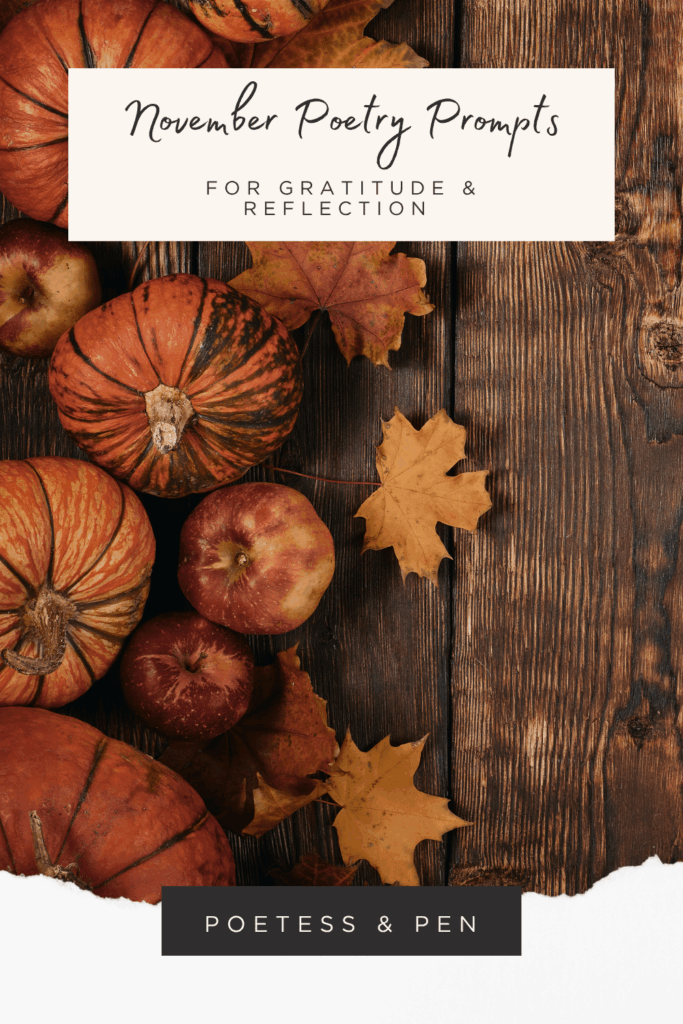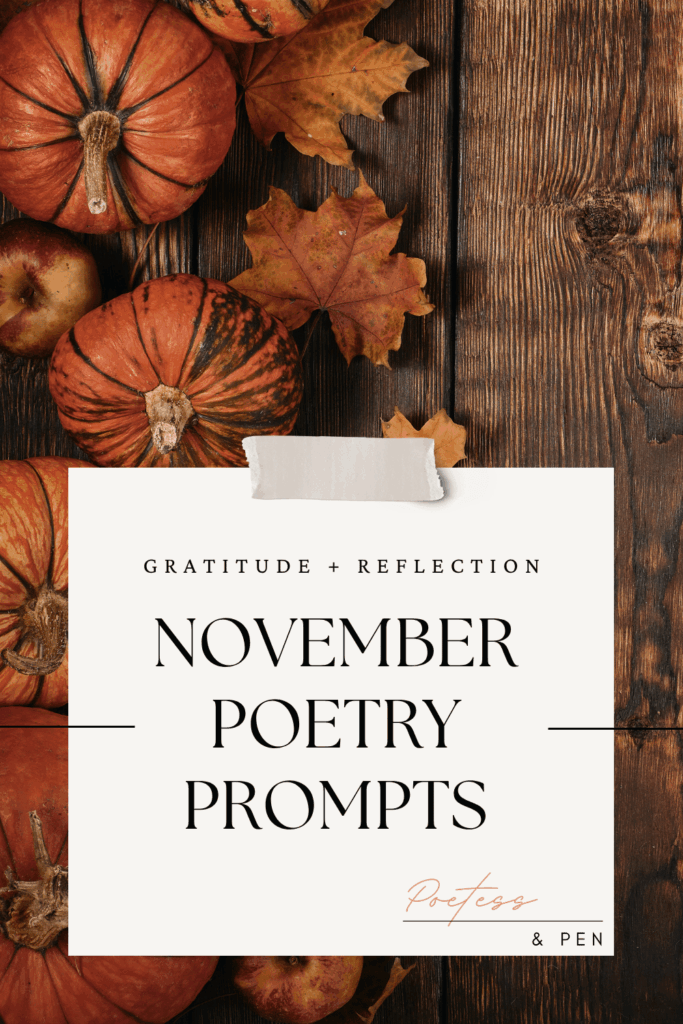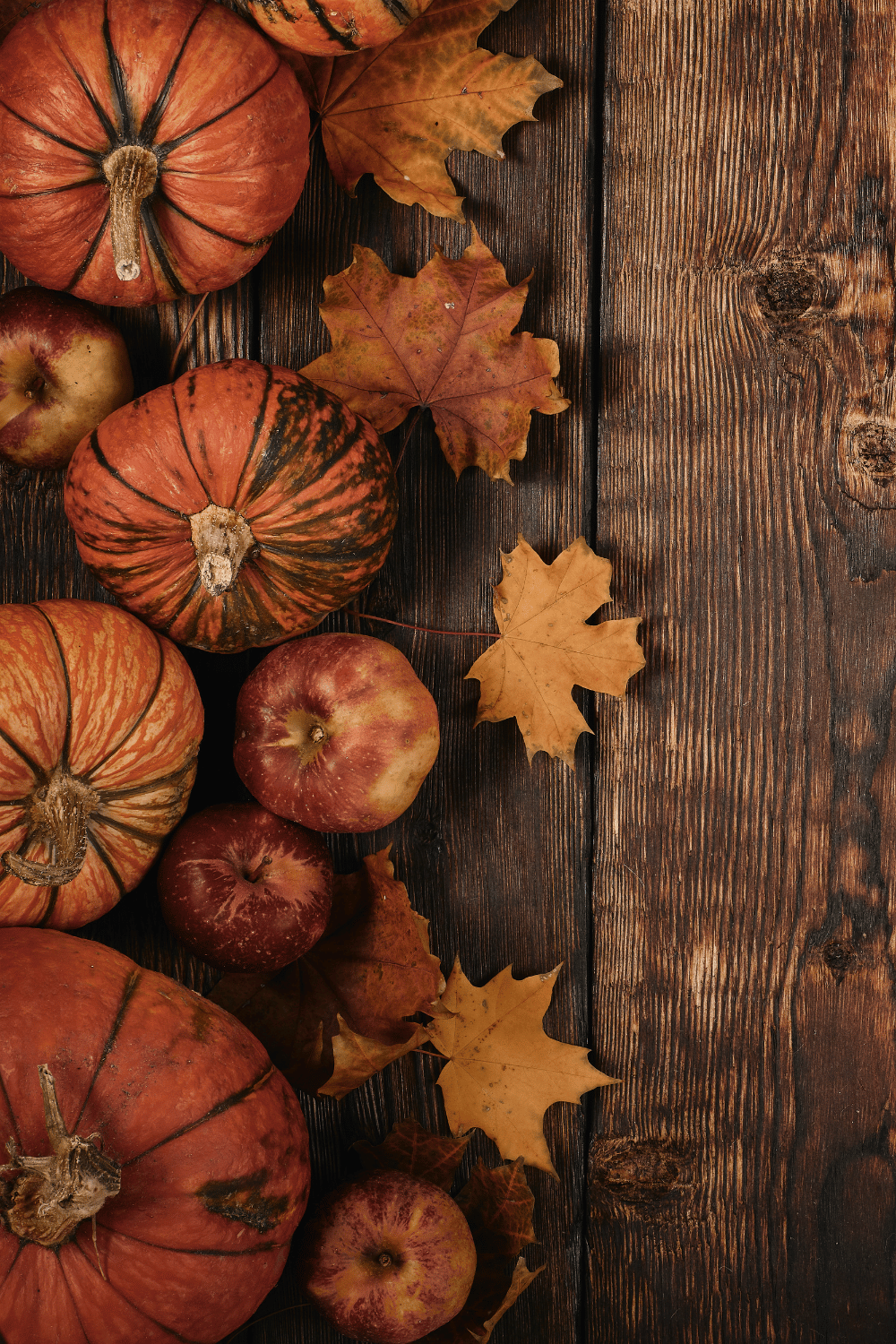There’s something sacred about November. The world softens into stillness—trees stand half-bare, evenings arrive early, and gratitude hums quietly beneath the day. Coffee cups warm our hands. Candles flicker beside open journals. The air smells of something both ending and beginning.
The Poetry of November
In the hush of November, words fall like leaves—quiet, golden, and true.
Mary Kaye Chambers
November invites us to listen… to write what we feel but haven’t said aloud. To notice the small things: the way sunlight lingers on the table, the sigh of a closing door, the rhythm of thankfulness that runs beneath it all.
These prompts were gathered for moments like that. Whether you write daily or choose one that calls your name, may they help you find poetry tucked between the ordinary hours of November.
How to Use These Prompts
There is no wrong way to write. You might choose one prompt a day or one each week. You might jot a few lines in your morning journal or linger over a poem by lamplight. Let the words lead you.
Try pairing these prompts with:
- A photo that captures the mood.
- A journal reflection or gratitude list.
- A cup of tea and five quiet minutes.
Let the page become a place to breathe, reflect, and gather grace.
Gratitude & Gathering
The warmth of home, the sound of laughter, and the hush before prayer.
1. The Scent of Something Baking – Describe how familiar aromas stir memories and feelings of comfort.
2. The Empty Chair at the Table – Explore grief, remembrance, or the quiet presence of someone missed.
3. Hands Passing the Bread – Write about the beauty of sharing—both food and connection.
4. Laughter Over Dishes – Capture the joy found in simple, messy, after-dinner moments.
5. What I Meant to Say Before the Prayer – A prompt about unspoken gratitude or words that lingered on your tongue.
6. A Recipe Written in Fading Ink – Reflect on heritage, family traditions, and recipes that carry stories.
7. The Kindness That Felt Like Sunlight – Honor a small act of generosity that brightened your day.
Change & Stillness
The letting go, the quiet, the in-between.
8. Trees Teaching Surrender – What can you learn from the way trees release their leaves?
9. The Quiet Between Gusts of Wind – Write about stillness, calm, or what fills the spaces between movement.
10. A Sky That Doesn’t Promise – Explore uncertainty or the acceptance of what you cannot control.
11. Folding Away Summer Clothes – Reflect on transition, closure, and the changing of seasons in your own life.
12. A Leaf That Refuses to Fall – Write about holding on when it’s time to let go.
13. Still Water, Still Heart – Consider peace that comes from stillness or reflection.
14. Endings Written in Gold – Find beauty in closure or gratitude in completion.
Memory & Belonging
Where you came from. What remains.
15. The Smell of Your Grandmother’s House – Write through sensory memory and its emotional power.
16. Where the Stories Were Told – Recall a place where laughter or family stories lived.
17. What Stays When Everyone Leaves – Explore loneliness, resilience, or enduring love.
18. The Road That Always Leads Home – A poem about returning, belonging, and being known.
19. A Photograph You Almost Forgot – What emotion or memory comes rushing back when you see it again?
20. The First House That Ever Felt Safe – Reflect on the meaning of safety, home, and shelter.
21. What the Old Song Remembers – Let music guide your memory; what story does it tell?
Gratitude & Grace
Finding contentment in the small, sacred moments.
22. The Small Kindness That Changed You – Celebrate a gesture that reminded you the world is still good.
23. Something You Didn’t Notice Until Now – Write about a moment of awareness or revelation.
24. The Moment You Exhaled – Capture the instant you let go of worry and found peace.
25. What Forgiveness Feels Like – Describe forgiveness not as an idea but as a physical, emotional experience.
26. The Light After the Storm – Use contrast to show healing, restoration, or clarity.
27. Grace Served in Ordinary Dishes – Gratitude found in simple, everyday rituals.
28. Joy Found Without Searching – Write about unexpected happiness, contentment, or quiet delight.
The Heart’s Harvest
For the moments that gather us close.
29. What I’m Really Thankful For – Go beyond the obvious; name what gratitude feels like beneath the surface.
30. The Table Becomes an Altar – A sacred reflection on gathering, sharing, and belonging.
31. The Beauty in Ordinary Things – Write about how simplicity becomes holy when seen with grateful eyes.
32. The Conversation That Healed a Wound – Recall words that mended a heart or relationship.
33. Passing the Blessing Bowl – A tradition, a memory, or a symbolic way of giving thanks.
34. When Gratitude Found Its Way Back to Me – A poem about rediscovering thankfulness after hardship.
35. The Year’s Final Bloom – Symbolize resilience, hope, or beauty that refuses to fade.
Turning Prompts Into Poems
Start with freewriting – let the first words spill without judgment. Don’t edit; just listen.
When you’ve written a few lines, read them aloud. Feel the rhythm. Notice the images that rise.
Poetry is less about form and more about presence. It’s a way of paying attention—to gratitude, to memory, to grace in the smallest of things.
You might pair your poems with photos, turn them into journal pages, or collect them into your own November Poetry Journal.
🪞Reflection
Choose one poem you wrote this month that surprised you… the one that felt like truth.
Print it. Tape it to your wall. Let it remind you that your words matter.
💌 Before You Go
I’d love to hear from you — which prompt spoke to your heart the most?
Share a line or a favorite poem you wrote this month in the comments below. Your words might be exactly what someone else needs to read today.

How often should I write poetry?
As often as your heart needs to speak. Some write daily; others write once a week. What matters is presence, not perfection.
Do I have to rhyme?
Not at all. Free verse is beautiful. Let rhythm and imagery lead you instead.
What if I’m new to poetry?
Perfect. Poetry begins with noticing. Just write what you see, feel, and remember.
📖 Glossary
Prompt: A word or phrase used to spark creative writing.
Stanza: A grouped section of lines within a poem.
Free Verse: Poetry that doesn’t follow rhyme or meter.
Imagery: Language that appeals to the senses.
Metaphor: A comparison that reveals deeper meaning.
📍Don’t Forget To Save This Article On Pinterest ⤵︎



